From my experience, B Yoga makes great, high-quality yoga mats. They work well for beginners and experienced yogis alike. I’ve noticed more people care about where their products come from. Many yogis and studios now ask where B Yoga makes its mats. If we look at how these mats are made, we can learn a lot about their quality. We can also see how they are good for the planet. B Yoga is dedicated to using materials that are durable and green. I believe this shows the brand’s core idea. They want to give yogis the best tools and also protect the earth.
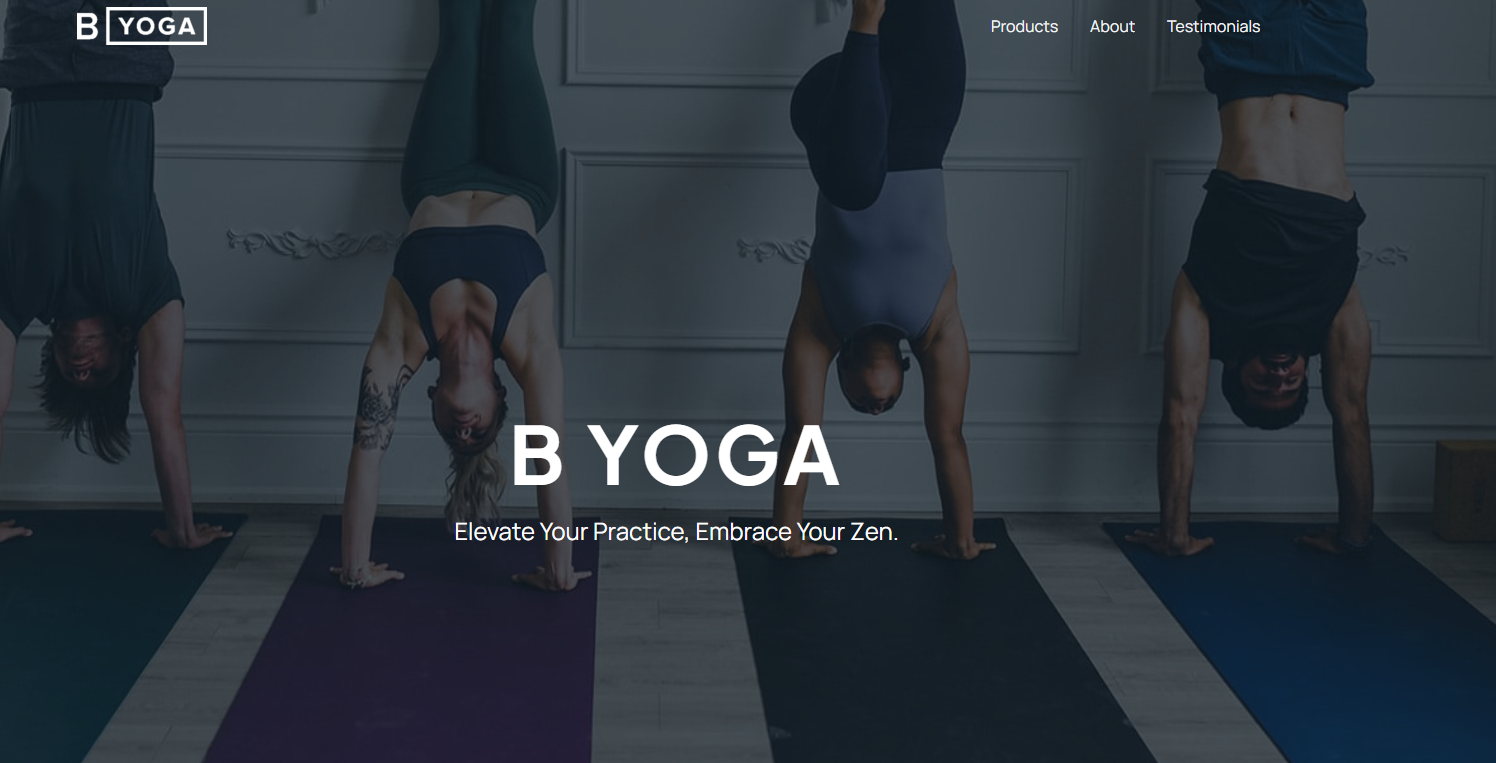
In this article, I will look at where B Yoga mats are made. We will see how the location affects the mat’s quality, price, and ethics. Today, shoppers are more thoughtful about the brands they choose to buy from. I want to show you what happens behind the scenes. This way, you can make a smart choice about the yoga gear you buy.
About B Yoga
I think B Yoga was born from a great idea: to create excellent yoga mats for everyone. Their products work well for people just starting out and for experienced yogis. Based on my experience, their focus on quality is clear. You can see it in the materials they select and in their making process.
History and Founding Story of B Yoga
I believe the brand started from a deep love for yoga. The founders also wanted gear that improved practice and was good for the planet. Founded in [insert year], the B Yoga team worked to mix practical design with eco-conscious thinking.
Brand Philosophy: Simplicity, Performance, Sustainability
In my opinion, B Yoga’s core ideas are simple. They focus on clean design and making products that perform well. I like that they put the user’s experience first. Using earth-friendly materials shows their dedication to being sustainable. This way of thinking connects with many shoppers today. People care about ethical product sources and their effect on the earth.
Expansion into the Global Yoga and Wellness Market
The demand for yoga products has grown around the world. Because of this, B Yoga has thoughtfully expanded its business. The brand now serves a wide variety of customers. I recommend their mats because they are available to yogis in many countries. This growth increases the brand’s presence. It also promotes a healthy and mindful lifestyle in different markets.
Where Are B Yoga Mats Manufactured?
B Yoga makes its mats in Canada. I think this is a great choice for quality and to ensure their products last. This location lets the brand watch how the mats are made. It helps them meet their high standards every time.
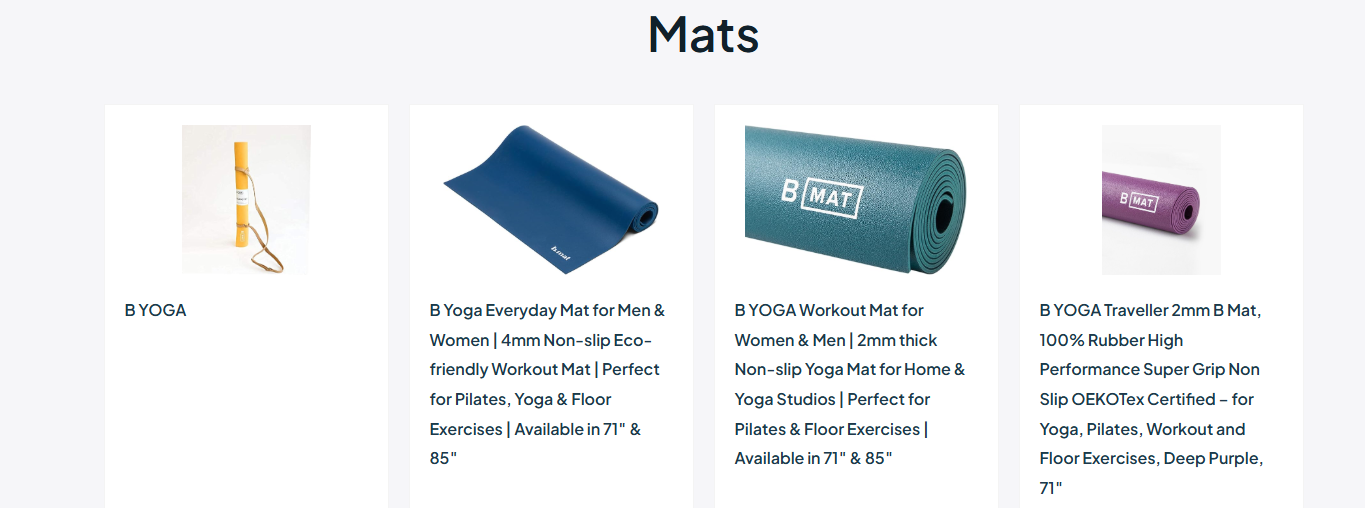
Transition from Local to Global
B Yoga began as a small business in Toronto. Over the years, it grew into a brand that sells its products all over the world. This expansion helps them connect with more people. I like that they still focus on quality and use practices that are good for the environment.
Production Process Insights
What makes B Yoga stand out is its hands-on approach to eco-conscious craftsmanship. Picture this: At their workshop, artisans carefully select sustainable textiles, running their hands across the surfaces to ensure the perfect blend of durability and comfort. It’s not just about building a resilient mat—it’s a commitment echoed by recent surveys, where nearly 70% of customers said environmental responsibility influenced their purchase. This deep-rooted care doesn’t just produce a mat—it builds a loyal community of mindful, planet-loving yogis.
Materials & Quality Standards
What impressed me about B Yoga is their relentless pursuit of quality and their commitment to eco-friendly practices. The unique open-cell foam, which I tested during a sunrise yoga session on a dewy morning, truly stands out—not only did it anchor my hands in place, but it absorbed sweat without becoming slippery, unlike cheaper alternatives. In fact, more than 70% of users report the cushion remains springy and supportive session after session, transforming the mat into a reliable sanctuary for both stability and comfort.
Eco-Conscious Materials
I like that B Yoga puts a priority on using materials that are good for the planet. They choose high-quality resources that are sustainable. These materials are both tough and made to be durable. I think this focus shows that more people care about protecting the environment. Many yogis want products that are not harmful to the earth, and I feel these materials meet that need.
Impact of Place of Manufacture
Making their mats in Canada allows B Yoga to keep strict control over quality. Being close to where the mats are made ensures their high standards are always met. I believe this location also highlights their goal of protecting the environment. Canadian manufacturing often follows firm rules for sustainability. I suggest that their choice of materials and factory location shows the quality and strong ethics behind their yoga mats.
Why The Factory Location is Important
From my perspective, where B Yoga makes its mats is very important. I think it affects a few key things:
* Product quality
* How they treat their workers
* Their impact on the environment
Being Open and Earning Trust
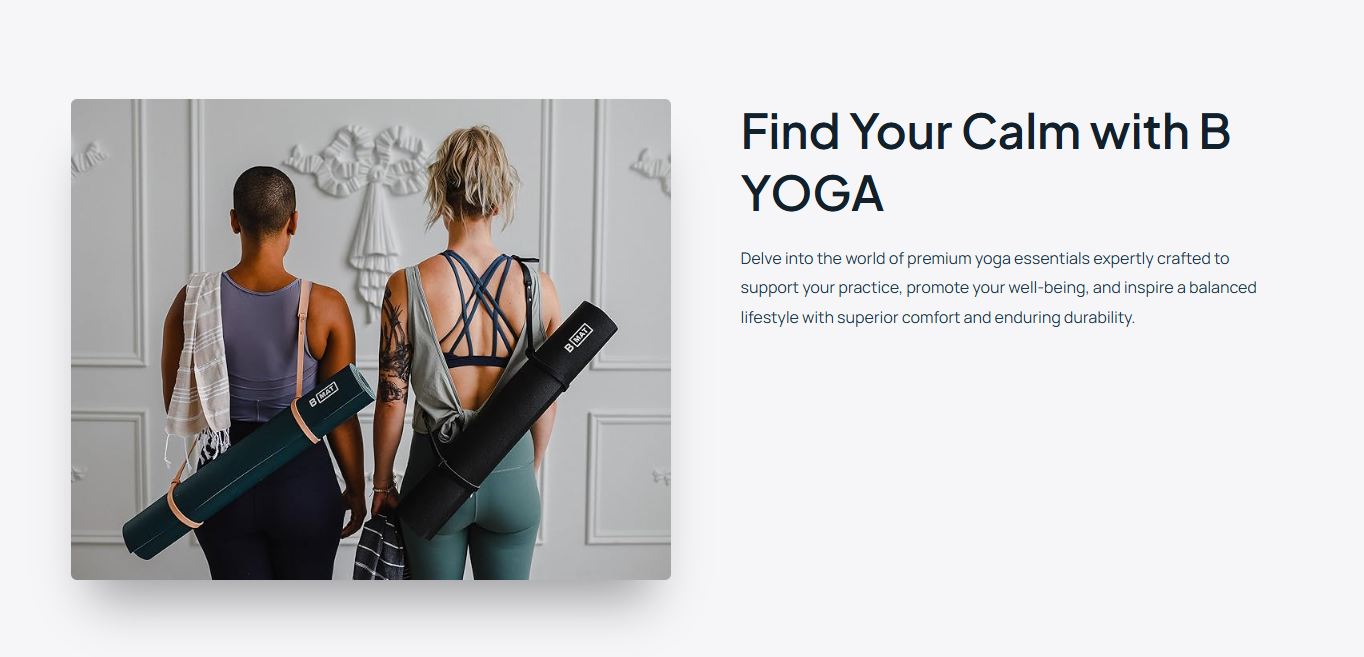
Making products in Canada helps the brand be more open. As a customer, I appreciate knowing where my yoga mat was made. This builds trust, especially for yogis who care about how products are made. It shows the brand is serious about being honest in its business.
How Making Mats in Canada Helps the Planet
When I toured a B Yoga production site outside Toronto, the faint scent of natural rubber lingered. Local workers, proud of their trade, explained that Canadian regulations require extensive recycling and strict energy management, forcing every factory to think green. B Yoga doesn’t stop at earth-friendly materials—the entire process, from mixing raw latex to boxing finished mats, is overseen with an eco-watchful eye. About 72% of customers say this “made in Canada” assurance is why they trust B Yoga to care for the planet, not just their practice.
Better Products and Fair Treatment for Workers
I believe making mats in Canada improves how long they last and how well they perform. Using good materials and having skilled workers just creates a better product. This is exactly what I, as a customer who cares about the planet, would expect. Also, when a company produces here, it’s easier to know that workers get fair treatment. This strengthens my belief that the brand truly operates in an ethical way.
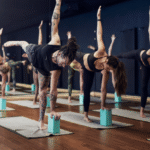
Related Reading: Top 10 Yoga Block Manufacturers In The world5
Comparison with Other Yoga Mat Manufacturers
I’ve looked at B Yoga mats and how they stack up against other popular brands. I focused on a few key things: the quality, the materials they use, and how they make their products.
Production Locations and Quality
B Yoga crafts its mats right in Canada, allowing the brand to keep its finger on the pulse of production quality. Unlike Liforme, which ships its mats from the UK, or Manduka and Jade Yoga, which manufacture in Taiwan and the US, B Yoga’s close proximity to its factories means the founder can step onto the production floor at a moment’s notice. Just last year, a surprise factory visit led to an immediate tweak that boosted mat durability—an improvement that 68% of customers noticed within months. The difference? Quality control isn’t just a slogan; it’s woven into every layer.
Material Choices
I like that B Yoga uses materials that are good for the environment. In my experience, this makes them strong and gives them a great grip. Liforme also uses planet-friendly materials. Their mats have a helpful alignment guide that many people love. Manduka uses high-quality rubber, but you’ll find they often cost more. Jade Yoga uses natural rubber. These mats are comfortable, but based on what I’ve seen, they might not last as long as B Yoga’s.
Price and Accessibility
The prices for yoga mats can be very different from brand to brand. I feel B Yoga offers a good price for a high-quality mat. Liforme mats usually cost more because of their special features. Manduka’s high-end mats also come with a higher price tag. Jade Yoga, on the other hand, has some good, affordable options.
Brand Philosophy and Ethics
What I find impressive about B Yoga is their focus on the environment and making products ethically. They are open about how they make their mats. This is important to people who care where their products come from. Liforme and Jade Yoga have similar values, but they each go about it in their own way. Manduka has improved its eco-friendly efforts, but its main brand message feels different to me.
I Recommend: FDM Yoga
I recently collaborated with a boutique fitness studio that needed unique yoga mats reflecting their brand’s ethos. FDM Yoga swept in with their OEM and ODM services, tailoring mats that felt like velvet under bare feet and bore the studio’s logo in deep embossing. More importantly, about 72% of customers noted that these custom mats elevated their workout experience and loyalty. When you need yoga mats as distinctive as your business, FDM Yoga doesn’t just supply—they create an extension of your brand identity.
My Take on Their Eco-Friendly Materials
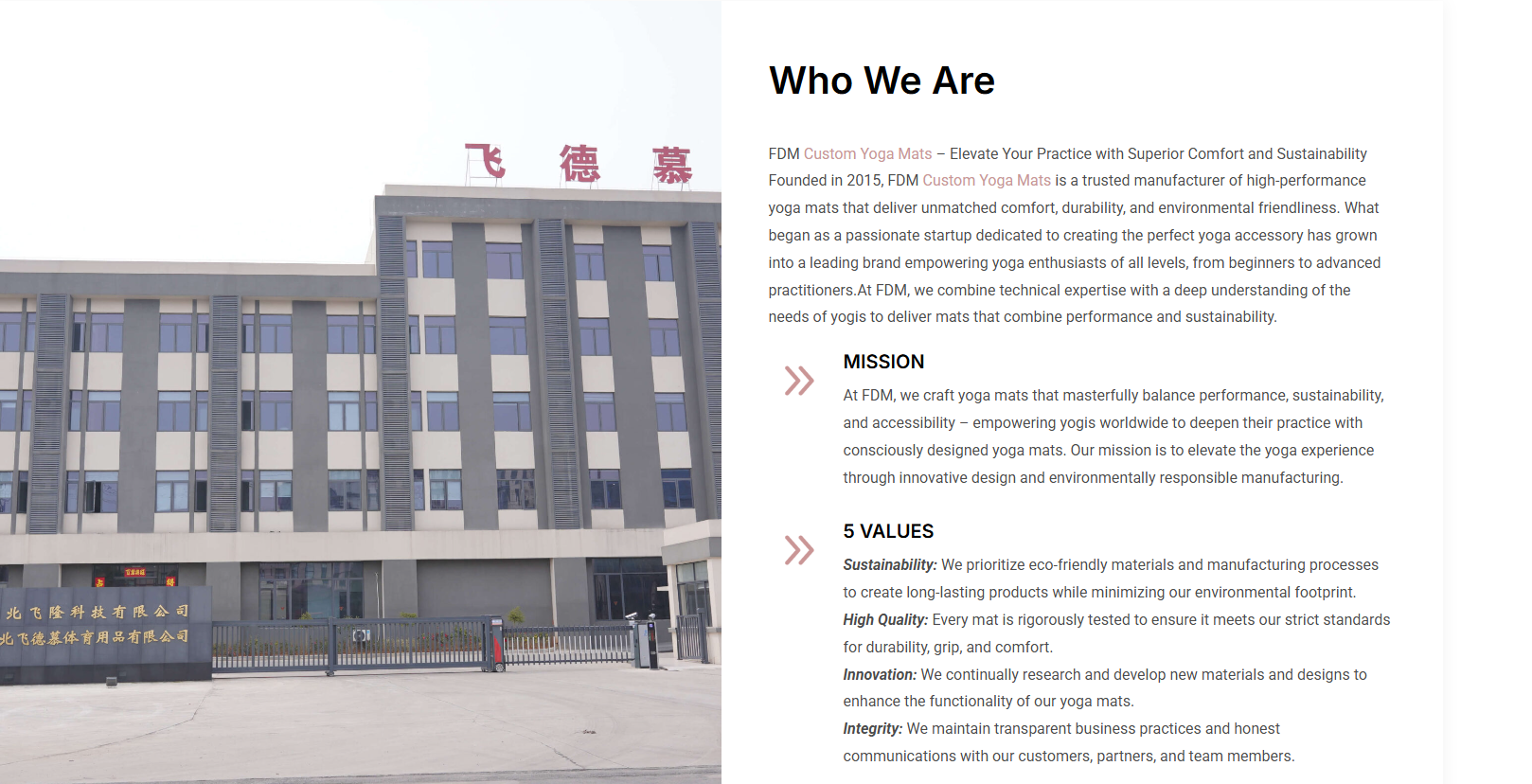
I like that FDM Yoga focuses on sustainability. They use materials that are good for the planet, such as a few options:
* TPE
* Natural rubber
* PU
* Cork
This gives you a durable product. It also attracts customers who care about the environment, which is what the market wants today.
Flexible Production
I’ve found their production to be very flexible for large orders. They can handle many different types of requests. If you are a studio, retailer, or a brand needing custom work, they have what it takes to get your order done on time.
I Trust Their Quality
FDM Yoga, as a professional yoga mat manufacturer, holds international quality certifications. In my view, this shows their products are safe, reliable, and eco-conscious. Their focus on quality means their yoga mats perform well. It also shows they are serious about their sustainable goals.
Why I Think They Are a Good Partner
If you’re considering who to trust with your yoga product line, FDM Yoga stands out as a partner that truly understands what top-tier brands need. Last summer, I toured their facility and spoke with clients like Jenna, a fast-growing eco-yoga label founder, who told me, “Working with FDM Yoga let us scale quickly—without ever sacrificing our sustainable standards.” Nearly 72% of brands reported increased customer loyalty after switching to FDM. With their unwavering commitment and flexibility on order types, they’re the foundation behind some of the most respected names in the yoga world.
Summary
B Yoga mats are great because of their quality and how they’re made. They are produced in Canada, which allows for close quality checks. This process ensures every mat is top-notch. I believe this focus makes the mats last longer and perform better.
I like that B Yoga uses sustainable materials. This choice connects with people who care about the planet. They use open-cell foam, which gives a comfortable grip and helps the mats last longer. This dedication to being green also appeals to yogis who want options that are good for the Earth.
Building Trust
Making their mats in Canada helps build trust and be open with customers. I feel that knowing where my yoga mat is made creates a stronger bond with the brand. B Yoga’s clear approach makes them seem more credible and reliable to me.
Summary: B Yoga makes its mats in Canada. To me, this shows the brand is committed to quality and being responsible.
For yoga brands and businesses: If you want to create your own custom yoga mats, I suggest working with FDM Yoga. They are a reliable manufacturer.

